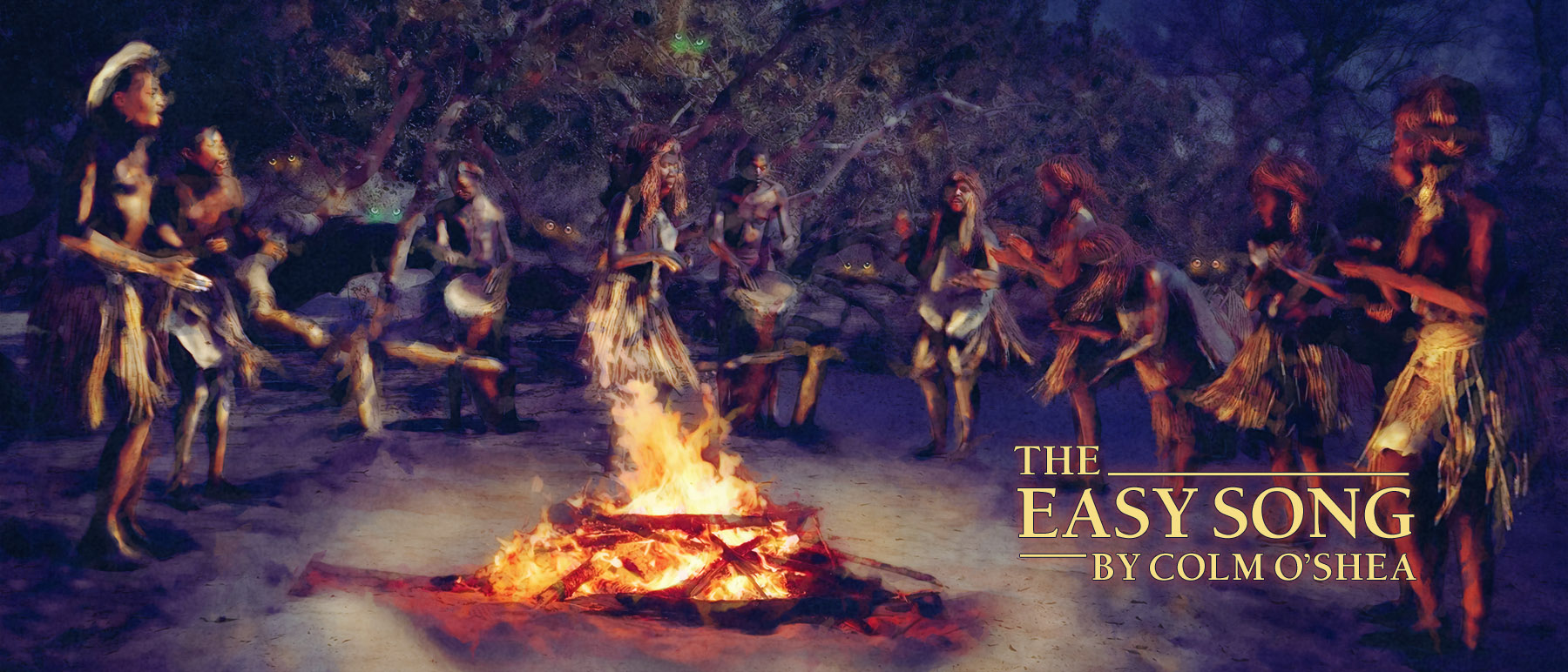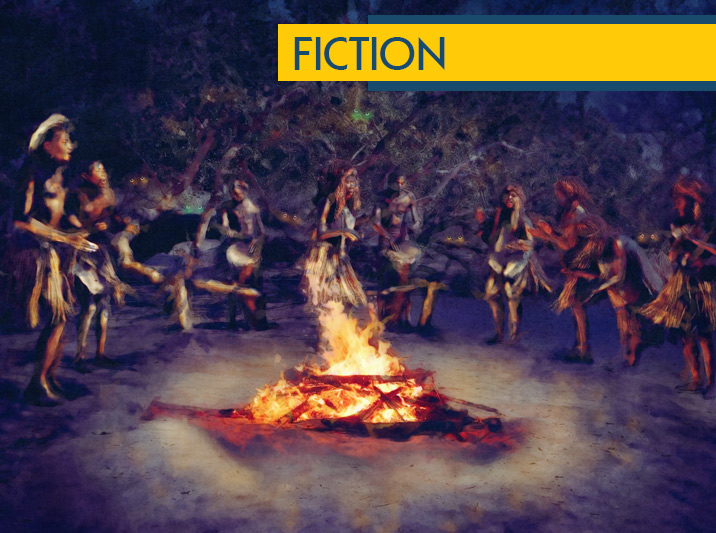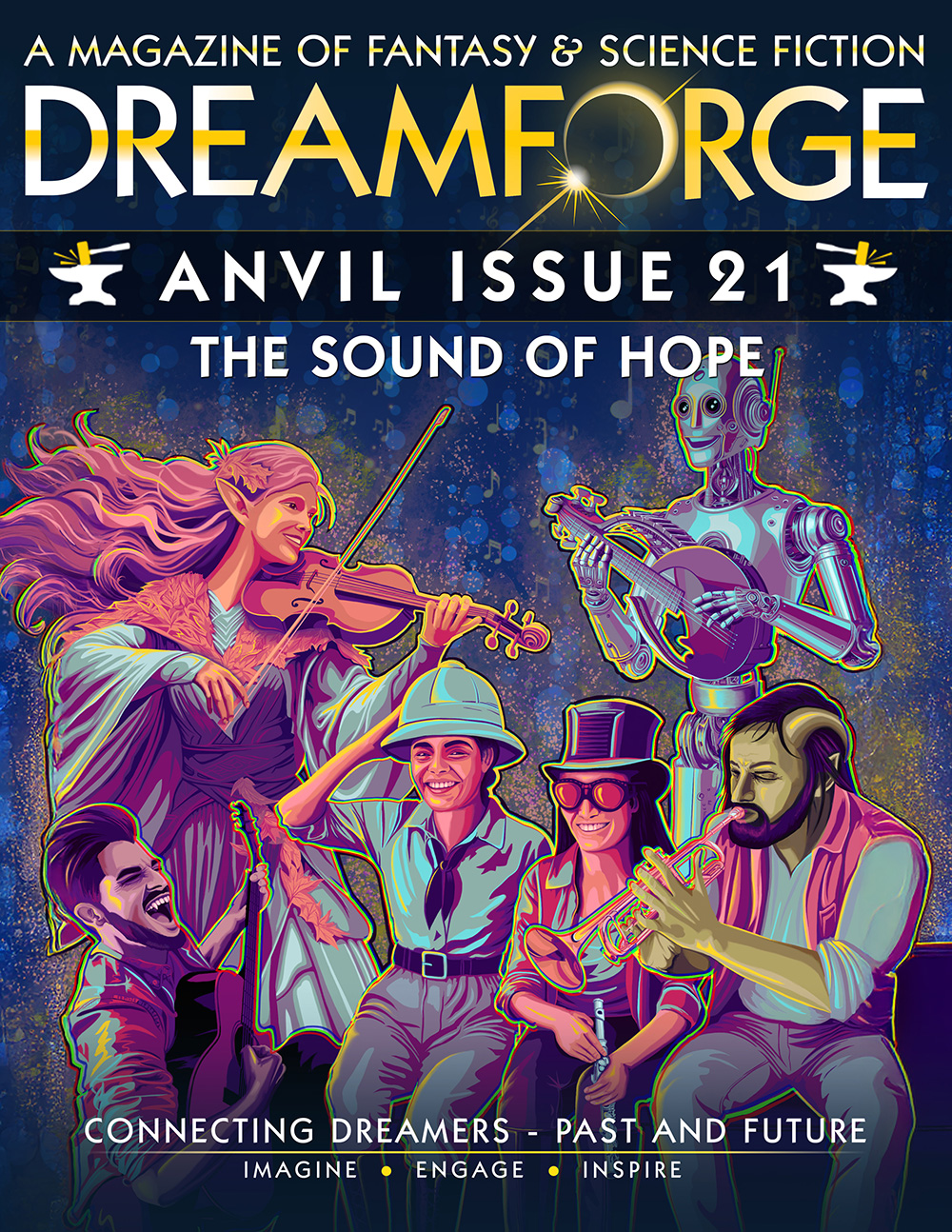 Looking back, it’s so foggy, like trying to remember a past life. I grasp images, but not well. I remember flying from the U.S., and then the Cessna to a dirt strip somewhere. Then an endless jeep drive on the worst roads in the world. It was rainy season, and we slid off the trail into the brush several times. It took a whole day to travel 20 miles uphill in mud, my driver-guide swearing unintelligibly between bouts of silence. When we arrived at the outskirts of the Ntuti settlement near nightfall, the tribe was relaxing around the ring of their campfire. They were singing, and although I’d never heard the song, and couldn’t possibly understand the words, I felt like I was being welcomed home.
Looking back, it’s so foggy, like trying to remember a past life. I grasp images, but not well. I remember flying from the U.S., and then the Cessna to a dirt strip somewhere. Then an endless jeep drive on the worst roads in the world. It was rainy season, and we slid off the trail into the brush several times. It took a whole day to travel 20 miles uphill in mud, my driver-guide swearing unintelligibly between bouts of silence. When we arrived at the outskirts of the Ntuti settlement near nightfall, the tribe was relaxing around the ring of their campfire. They were singing, and although I’d never heard the song, and couldn’t possibly understand the words, I felt like I was being welcomed home.
Not every visitor says that. The Ntuti people have been plagued by anthropologists and their grad students, naturalists, and evolutionary biologists, have had heart monitors placed on them for days, had urine and blood samples taken, etc. Now they meet strangers with jaded patience. There’s no wonderment at outsiders, just acceptance. They’re a cottage industry, a curiosity for a world that is trying to keep its distance and not interfere but just can’t stop staring. I remember photographing Keith Richards on one assignment— his here-we-go-again handshake. He was nice, actually, but he didn’t change because a camera was present.
Perhaps I imagined it —or needed it to be true— but I felt welcomed here. Recognized.
Emala, a young Ntuti, becomes my liaison. She speaks broken English picked up from years of gawking visitors like me. She points to baby foxes scrounging near the camp, singling out one curious cub who keeps wandering nearby.
“That one,” she says with certainty. “That is Ntuti.” I’m encouraged to feed and name it. “Keith” I dub him, a word that sounds hilarious to Emala. Other tribe members make similarly opaque selections. One man coaxes a baby rat from its siblings with some grain. An elderly woman retrieves a blue egg from a nest. The old woman cradles the beautiful egg, dismissing the squawking mother. Emala translates: “Not yours, fool.”
Over weeks, the wonders unfold. The rat loses its tail, and swells in size. The snout shortens. It waddles on hind legs. The hatchling sheds feathers, the bare wings filling into a pair of chubby arms. My little Keith molts daily until I gaze into a pair of unmistakably human eyes. And even more astounding— they are green! We have the only green eyes for hundreds of miles in any direction, but other than that, he’s Ntuti.
The children’s transformations are stunning. Is it how gradual they are, or how sudden? It’s both, somehow. This, I am told, is how all Ntuti enter the human world. Everyone is adopted. The selection process remains obscure; all I can glean is that the children know and present themselves through subtle signs. I take photos. So many photos. Keith, I’m ashamed to say, dominates my portfolio.
Entering the human world is called joining the fire family, or fire circle— the Ntuti word for “family” and “circle” or “ring” is the same. It’s also called joining the easy song, and after weeks sitting by the evening fire, absorbing the rhythms and cadences of our music, I come to grasp this phrase. In the brush, mere yards from where we lull ourselves around flames, one hears ragged cries of creatures being savaged. That is wilderness: No rhyme, no rhythm, just panic. Run! Freeze! Run! Freeze! A lone animal’s terror, lost under infinite stars.
In the elderly, the first sign is usually losing the tune, or breaking rhythm. I know this will happen, and yet it’s devastating to watch. Unlike the babies, who join quickly, farewells for elderly loved ones can be painfully protracted. The wilderness reclaims them in fits and starts, sometimes cruelly receding before reasserting itself. The victims —I can only think of them as victims— are conflicted, lashing out but afraid to leave, loitering near the fire circle at night, howling or scrounging for food. They retain just enough human features that turning one’s back on them seems evil. But I’m told that’s the only way. I look at Keith, wrestling with his brothers and sisters.
There’s no single loving God here, and so no conflict in that regard. Ntuti gods are many, and mostly animal, and tricksters abound. Everything is temporary, they repeat. We’re all foster brothers and sisters, all temporarily caring for each other. Even our tents blend with the dry grass. One could forget we were here. I’m already forgetting the loud, insane world I left behind, the steel and glass monstrosity bellowing into the night that it will last forever, never forget, and never, ever sleep.
I feel guilt for losing touch with my own family long before I came here.
Watching these farewells between grandmother or grandfather and their kin is wrenching. How they snap, bite, and then plead for a hug.
I dream incessantly of sliding up a dirt road, trying not to slip off into the brush.
The kids broke my camera’s memory card. I don’t care. Soon after, I stop note-taking also. The satellite signal is getting treacherous, and my editor has forgotten me. So what? This is home now— there’s nobody outside our circle I must report to. I have the routine down. No one objects to me.
And how can I leave my beautiful Keith?
The rains brim. I can smell them. Digging roots will be harder now, less social and fun. Mud isn’t fun. But my claws are growing in. That should help. For a short time.
The wilderness has a pull, like the moon. Fight it. Lean toward the flames as they lick the sky; enjoy the warmth of company. My flickering siblings and I sing in one voice, these ancient words, like we’ve always known them, and always will. Oh, how easily they come.












